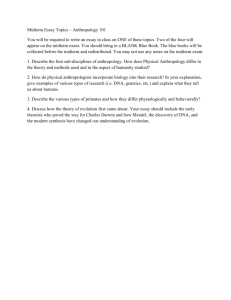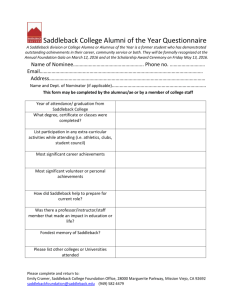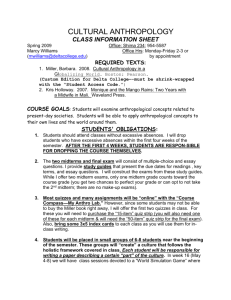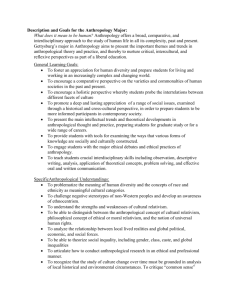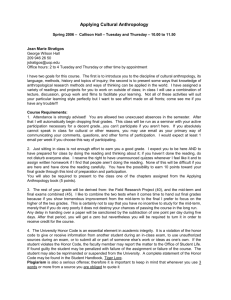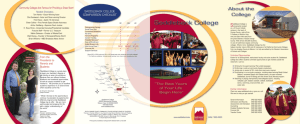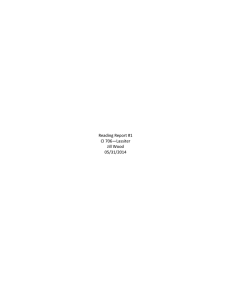syllabus-15220 - The Faculty Center
advertisement
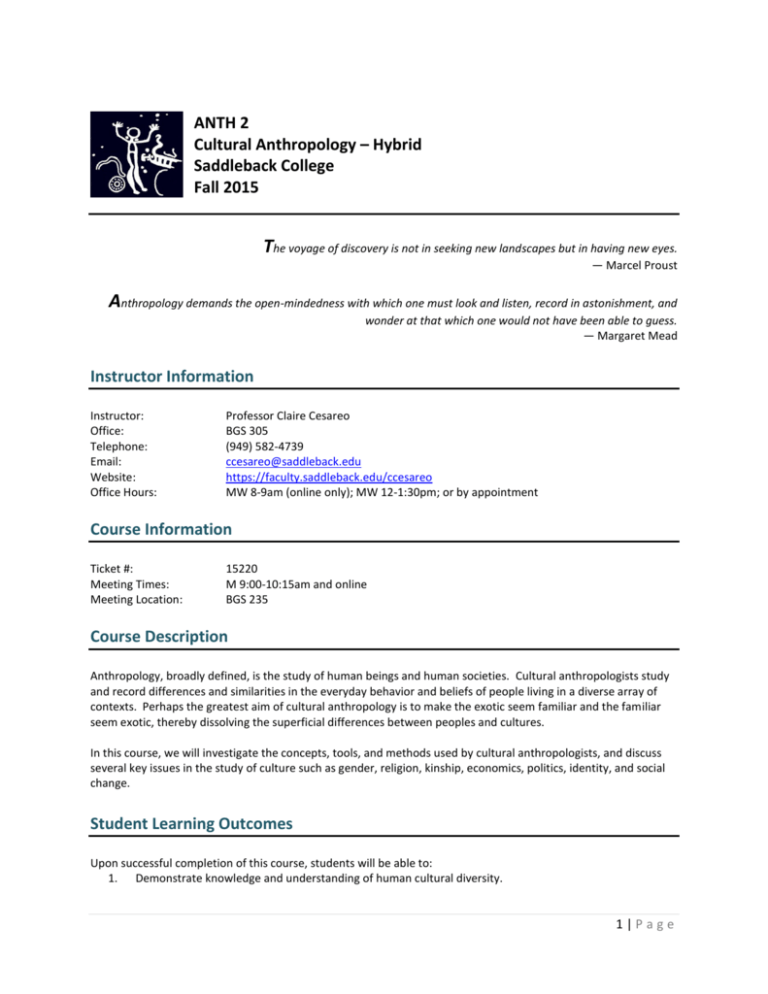
ANTH 2 Cultural Anthropology – Hybrid Saddleback College Fall 2015 The voyage of discovery is not in seeking new landscapes but in having new eyes. — Marcel Proust Anthropology demands the open-mindedness with which one must look and listen, record in astonishment, and wonder at that which one would not have been able to guess. — Margaret Mead Instructor Information Instructor: Office: Telephone: Email: Website: Office Hours: Professor Claire Cesareo BGS 305 (949) 582-4739 ccesareo@saddleback.edu https://faculty.saddleback.edu/ccesareo MW 8-9am (online only); MW 12-1:30pm; or by appointment Course Information Ticket #: Meeting Times: Meeting Location: 15220 M 9:00-10:15am and online BGS 235 Course Description Anthropology, broadly defined, is the study of human beings and human societies. Cultural anthropologists study and record differences and similarities in the everyday behavior and beliefs of people living in a diverse array of contexts. Perhaps the greatest aim of cultural anthropology is to make the exotic seem familiar and the familiar seem exotic, thereby dissolving the superficial differences between peoples and cultures. In this course, we will investigate the concepts, tools, and methods used by cultural anthropologists, and discuss several key issues in the study of culture such as gender, religion, kinship, economics, politics, identity, and social change. Student Learning Outcomes Upon successful completion of this course, students will be able to: 1. Demonstrate knowledge and understanding of human cultural diversity. 1|Page 2. 3. 4. 5. 6. 7. 8. Discuss the benefits and limitations of the various methodologies used by cultural anthropologists, especially fieldwork and participant-observation. Explain the importance of cultural relativism in the analysis of global diversity, and discuss how this perspective differs from ethnocentrism. Define the concept of culture, and differentiate between cultural and individual perspectives of the world. Demonstrate an understanding of holism, and the interrelationship between different aspects of a culture. Identify and outline the anthropological framework of kinship, political, social, economic, and religious systems in a global context. Critically analyze the process of globalization and its effects upon cultures around the world. Articulate an anthropological perspective on current issues and concerns in the field of cultural anthropology. Required Texts The following books are required and are available at the college bookstore or through online sources: Lassiter, Luke Eric th 2014 Invitation to Anthropology. 4 Edition. Rowman and Littlefield Publishing Group, Inc. ISBN: 9780759122543. Holmes, Seth 2013 Fresh Fruit, Broken Bodies: Migrant Farmworkers in the United States. University of California Press. ISBN: 978-0520275140. Additional Readings: There are also a number of other required readings that will be available on the Blackboard course site. Course Requirements I. Attendance and Participation: Students are expected to keep up with the readings and online materials/activities, attend class, and actively participate in classroom discussions and activities. II. Writing Assignments: There will be two short (4-5 page) writing assignments that require students to apply the theories and concepts covered in the course. Specific instructions will be discussed in class. III. Midterm Exam: The midterm will consist of multiple choice, true-false, and essay questions. A study guide will be distributed one week before the exam. IV. Final Exam: The final will be identical in form to the midterm. Grading Criteria I use percentages not points to calculate your grade. Your course grade will be calculated as follows: 2|Page Attendance and Participation Writing Assignments (2 x 15%) Midterm Exam Final Exam 30% 30% 20% 20% All grades, including the course grade, will be based on the following standard grading scale: Grade A B C D F Percentage 90-100% 80-89% 70-79% 60-69% below 60% Course Policies and Student Responsibilities 1. Attendance Sheets: Students must sign-in on the Attendance Sheet each day using their full signature – not initials. If you are late for class and miss the sign-in sheet, it is your responsibility to come up to my desk and sign yourself in before you leave. 2. Lateness: Arriving late is disruptive to the entire class, so please make every effort to arrive on time. If you must come into the classroom late (or leave early), do so quickly and quietly. 3. Class Dismissal: Please do not start to pack up your belongings until I excuse you for the day. It is impossible for others to hear over the rustling of papers, etc. 4. Cell Phones: Turn off the ringer on your cell phone upon entering the classroom. 5. Late Work: Late work will only be accepted if you contact me on or before the due date. You need not concoct an extravagant reason for needing an extension; all excuses are valid. Students will then be given a revised due date, after which there will be no more extensions. Do not be afraid to contact me if you are having any problems with the assignments, but please do so as early as possible. 6. Extra-Credit Policy: During the semester, there will be a number of opportunities to earn extra-credit points. All extra-credit work must be submitted by the last day of class. You may earn a maximum of 15 extra credit points, and this will be calculated into your final exam score at the same percentage rate (20%). This means that if you earn 15 extra credit points they will be multiplied by .20, thus adding 3 percentage points to your overall course grade. 7. Preparedness: Come to class prepared, having read the materials, and ready to engage in a discussion of the topic at hand. It is everyone’s obligation to make this class fun and rewarding. 8. Student Demeanor: Please treat everyone with courtesy and respect. I encourage all students to participate openly and freely in the course discussions, and I expect students to respect the opinions of others. This does not mean you have to agree with everything I or another student says, but you must disagree in a non-threatening and productive manner. 9. Quality of Work: This is a college course therefore I will expect college-level work. Your ability to clearly express thoughts and ideas will be included in the grading of your papers. 10. Plagiarism: Plagiarism, the use of someone else’s published or unpublished work in whole or in part without attribution, is a major infraction of Saddleback’s Academic Honor Code. Proven plagiarized work will be given a 0/F. Please contact me if you need more information on how to correctly cite the work of others in your papers. 11. Cheating: Students found cheating on an exam or assignment will receive a 0/F for that exam or assignment. 12. Withdrawals: Students who do not log-in and/or complete work for 2 consecutive weeks may be dropped from the course. However, do not expect to be automatically dropped if you stop attending. It 3|Page is your responsibility to make sure that you are officially withdrawn by drop date or you may receive an F for the course. 13. Repeats: By California law, students are now able to take a course only 3 times, inclusive of the times for which they received a W or an F. If you are taking this course for the third time, be sure that you complete the course with a passing grade! Students with Disabilities This course meets the requirements set forth in the accessibility checklist and universal design grid provided by Special Services. The web pages, video presentations, textbooks, and class materials used in this course are accessible to students with disabilities. Other accommodations are available for students who have a documented disability. Documentation is done through the Office of Special Services in the Student Services Center, Room 113; 582-4885. Please see me early in the semester if you need to discuss any particular issues. Blackboard Course Site This course is a 50% hybrid course, so you will be expected to do 50% of the work in the online class site. In order to take this course, therefore, you must have a computer with online capabilities. Your computer should have at least 4GB of RAM and a broadband internet connection (cable or DSL). You can use a wireless connection for much of the class but will need to use a wired connection for exams. If you do not have access to such a system, you can use the computers in the Learning Resources Center or the BGS computer lab, but I strongly urge you to evaluate the feasibility of taking an online course without regular computer access. You access the course by typing in the following URL address: http://socccd.blackboard.com, or linking to it from MySite or the college’s main web page. Your user name is the same as your Saddleback email address up to but not including the @ sign (generally your first initial, last name, and one or two digits). Your password is the same as your e-mail account, generally your pin number plus two zeros. If you have changed your email password, your password for Blackboard will have also changed. If you have forgotten your password, you can log-on to MySite and change it. IMPORTANT: All communication will go out using your Saddleback email address, so you must utilize this account. If you are not in the habit of checking your Saddleback account, please begin doing so. Students who have their Saddleback email forwarded to their regular account sometimes do not receive group emails because of the policies of your internet service provider. Once you log-in, there will be a list of the courses in which you are currently enrolled. To access this course, just click on the link to Anth 2 – Cultural Anthropology. If you encounter any technical problems using Blackboard, please visit the Student Technical Support page at http://www.saddleback.edu/de/student-technical-support/. 4|Page Course Schedule Week TOPIC ONLINE WORK/ READINGS/ASSIGNMENTS Anthropological Understandings and Methods 1 Introduction to the Class – Culture Bingo Class: 8/17 2 Class: 8/24 The Anthropological Perspective and the Concept of Culture 3 Class: 8/31 Encountering the Other: Colonialism, Race, and the Birth of Anthropology 4 No class on 9/7 5 Class: 9/14 Encountering the Other (continued) Fieldwork and Ethnography Belief Systems 6 Magic and Religion Class: 9/21 7 Class: 9/28 Altered States of Consciousness/ Cultural Understandings of Sickness, Health, and Healing 8 Class: 10/5 Midterm Exam Cultural Persons 9 Men, Women and Beyond: The Cultural Class: 10/12 Construction of Sex and Gender/Rites of Passage I: Transitions to Adulthood 10 Class: 10/19 Body Modification in Rites of Passage Class Debate – Female Circumcision 11 Class: 10/26 Rites of Passage II: Death Rituals Constructing Relations 12 Kinship and Descent Class: 11/2 Read Week 2 lectures online Lassiter, Chapter 2 Articles – Miner and Geertz Writing Assignment #1 distributed Read Week 3 lecture online Lassiter, Chapter 1 Article – Bodley Watch Week 4 film online Writing Assignment #1 due Friday, 9/11, at 11:59pm Read Week 5 lecture online Watch fieldwork slideshow online Lassiter, Chapter 3 Article – Sterk Read Week 6 lecture online Lassiter, Chapter 7 Article – Gottlieb Midterm Exam study guide distributed Read Week 7 lectures online Watch Week 7 film online Read Week 9 lectures online Watch Week 9 film online Lassiter, Chapter 5 Article – Herdt Read Week 10 lecture online Articles – Shweder and Kratz Read Week 11 lecture online Article – Conklin Read Week 12 lecture online Lassiter, Chapter 6 Writing Assignment #2 posted 5|Page Week TOPIC 13 Rites of Passage III: Marriage Practices Class: 11/9 Film (No Wed class 11/11) Economics and Globalization 14 Making a Living: Production, Exchange, and No Class on Consumption 11/16 (No Wed class on 11/18) 15 Economics Across Borders Class: 11/23 Belonging and Exclusion 16 Equality, Inequality, and Social Control/Naturalizing Class: 11/30 Social Inequality and Suffering 17 Class: 12/7 Conclusions: Applying Anthropology Finals Week Final Exam Monday, 12/14, 10:15am-12:15pm ONLINE WORK/ READINGS/ASSIGNMENTS Read Week 13 lecture online Read Week 14 lecture online Writing Assignment #2 due on Friday, 11/20, at 11:59pm Watch Week 15 film online Holmes, Forward and Chapters 1-3 Read Week 16 lectures online Watch Week 16 film online Holmes, Chapter 4 and 6 Final Exam study guide distributed Holmes, Chapter 7 Last week to submit extra credit Other Important Dates Last Day to Drop without a “W” 9/8/2015 Last Day to Change Grading options (letter grade or P/NP) 9/22/2015 Last Day to Drop without a Letter Grade 11/2/2015 6|Page
